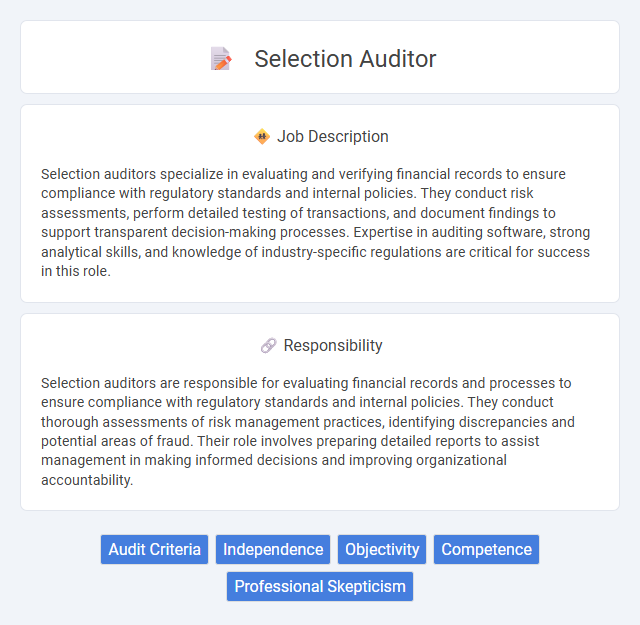
Selection auditors specialize in evaluating and verifying financial records to ensure compliance with regulatory standards and internal policies. They conduct risk assessments, perform detailed testing of transactions, and document findings to support transparent decision-making processes. Expertise in auditing software, strong analytical skills, and knowledge of industry-specific regulations are critical for success in this role.
Candidates with strong attention to detail, analytical skills, and integrity are more likely to excel in the selection auditor role. Individuals who thrive in structured environments and can handle complex documentation may find this job suitable. Those lacking patience for meticulous processes or comfort with regulatory standards might face challenges in this position.
Qualification
Selection auditors require a strong background in accounting or finance, typically holding a bachelor's degree in accounting, finance, or business administration. Professional certifications such as Certified Public Accountant (CPA) or Certified Internal Auditor (CIA) significantly enhance a candidate's qualifications. Proficiency in audit software, analytical skills, and a thorough understanding of regulatory standards are essential for effective audit selection and evaluation.
Responsibility
Selection auditors are responsible for evaluating financial records and processes to ensure compliance with regulatory standards and internal policies. They conduct thorough assessments of risk management practices, identifying discrepancies and potential areas of fraud. Their role involves preparing detailed reports to assist management in making informed decisions and improving organizational accountability.
Benefit
Selecting an auditor likely enhances financial accuracy and regulatory compliance, reducing the risk of errors or fraud. This process probably improves stakeholder confidence by ensuring transparent and reliable financial reporting. Effective auditor selection may also optimize operational efficiency through expert insights and recommendations.
Challenge
Selecting an auditor likely presents significant challenges due to the critical need for expertise in risk assessment and assurance standards. The complexity of regulatory requirements increases the probability of difficulties in identifying candidates with both technical knowledge and ethical integrity. Evaluating an auditor's ability to adapt to evolving financial landscapes might also complicate the decision-making process.
Career Advancement
Selection auditor positions offer significant opportunities for career advancement within accounting and finance sectors by providing critical experience in financial compliance and risk assessment. Mastery in auditing standards and strong analytical skills often lead to higher roles such as senior auditor, audit manager, or compliance officer in major corporations or public accounting firms. Continuous professional development through certifications like CPA or CIA enhances eligibility for leadership roles overseeing audit teams or specializing in forensic and internal auditing.
Key Terms
Audit Criteria
Selection auditors rigorously apply audit criteria such as compliance with regulatory standards, accuracy of financial records, and effectiveness of internal controls to evaluate organizational performance. They utilize industry benchmarks and risk assessment frameworks to ensure alignment with best practices and identify areas for improvement. Mastery of audit criteria enables auditors to deliver precise, actionable insights that support transparency and accountability.
Independence
Selection auditors play a critical role in ensuring organizational transparency by maintaining strict independence from the entities they audit. Independence in auditor selection involves avoiding conflicts of interest and maintaining impartial judgment to deliver unbiased assessments. Strong independence safeguards the credibility of financial reporting and enhances stakeholder confidence in audit outcomes.
Objectivity
Selection auditors must maintain strict objectivity to ensure unbiased evaluation of candidates and processes. Their role involves assessing qualifications and compliance without personal or external influence, upholding integrity in decision-making. Objective auditing guarantees transparency and fairness, fostering trust in organizational hiring practices.
Competence
Selection auditor competence requires thorough knowledge of auditing standards, risk assessment methodologies, and regulatory compliance to ensure accurate evaluation of financial records. Proficiency in data analysis tools and strong critical thinking skills are essential for identifying discrepancies and improving internal controls. Effective communication and ethical judgment further enhance the auditor's ability to deliver reliable and transparent audit results.
Professional Skepticism
Selection auditors must exhibit strong professional skepticism to effectively evaluate financial statements and internal controls, ensuring accuracy and compliance with auditing standards. This mindset enables auditors to critically assess evidence, identify inconsistencies, and detect potential fraud or misstatements. Mastery of professional skepticism is essential for delivering reliable audit opinions and maintaining stakeholder trust.
 kuljobs.com
kuljobs.com